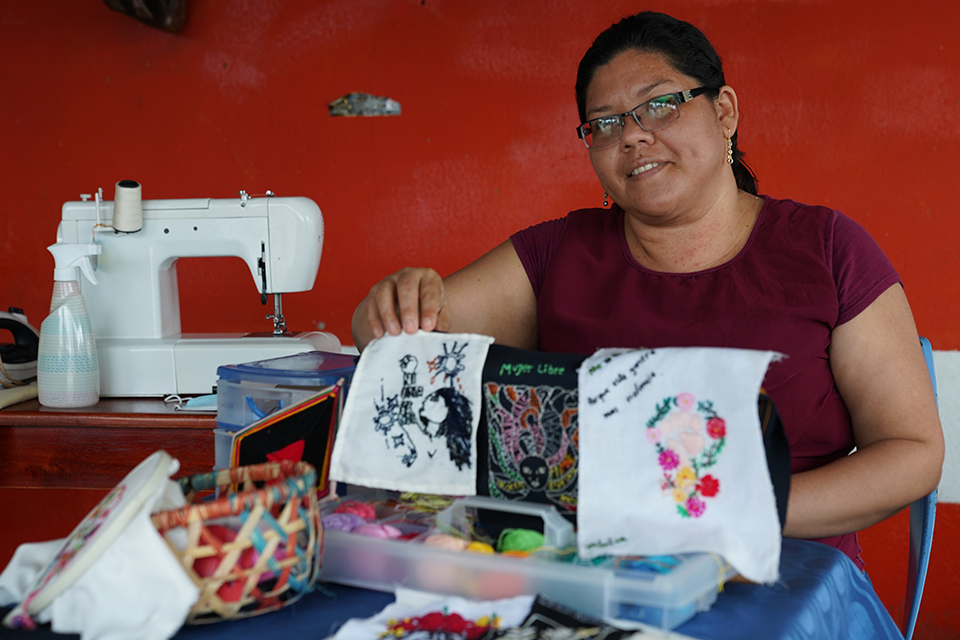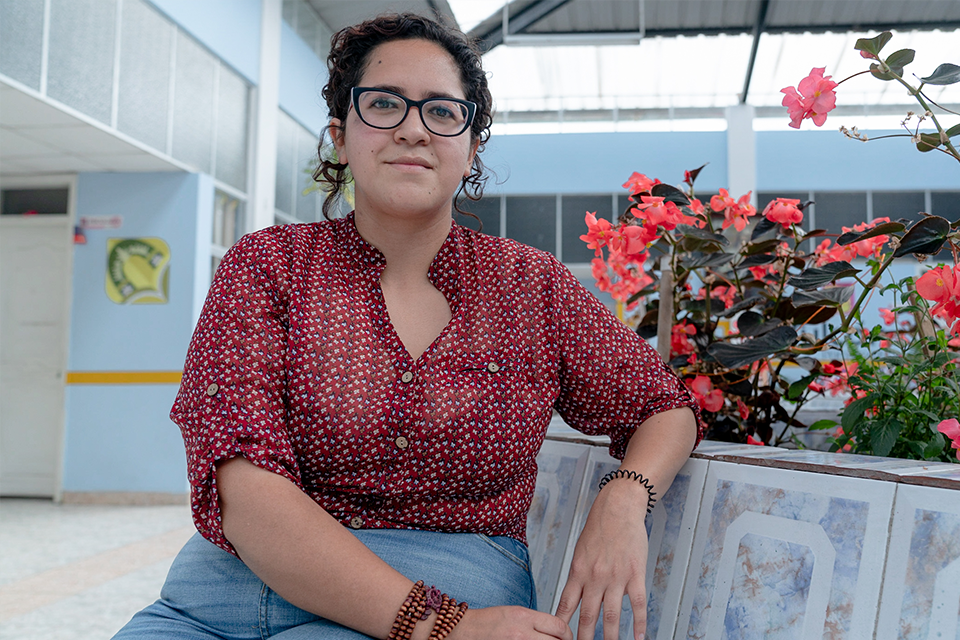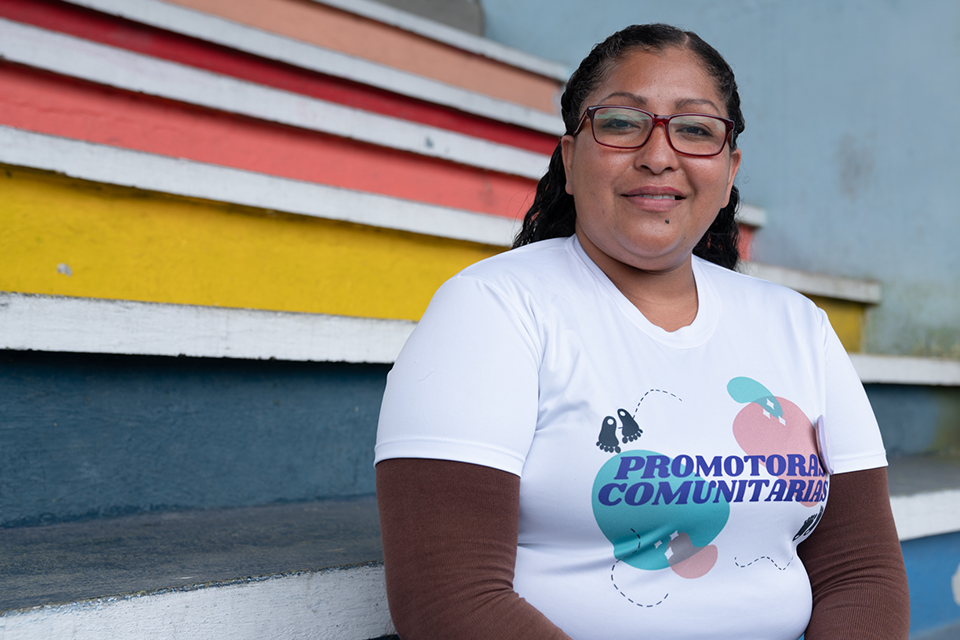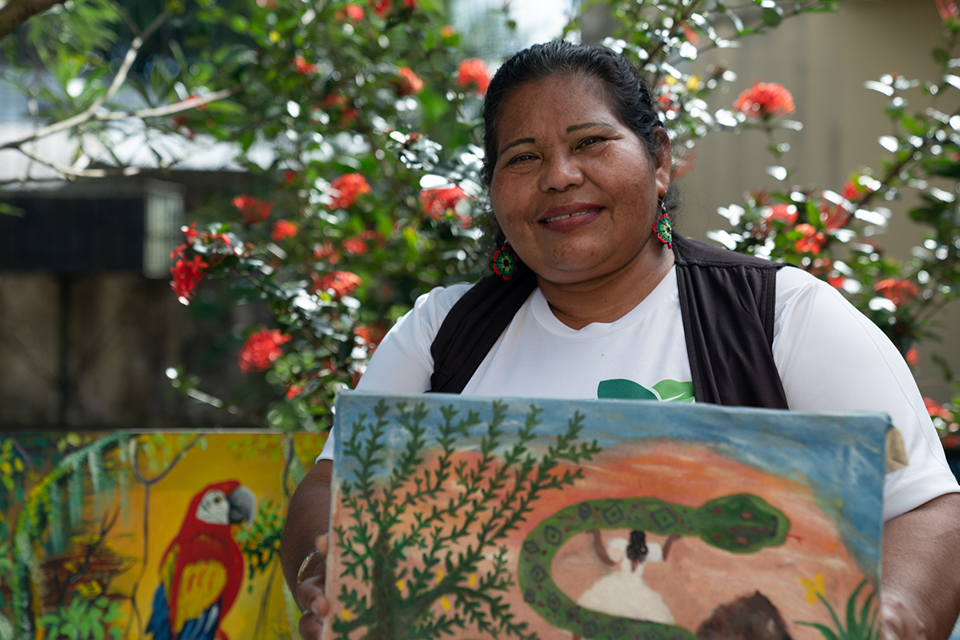Caminando: a project serving survivors of violence in Ecuador
Date:
Women and girls have the right to a life free of violence and safe spaces in which they can fully develop.
In the region, human mobility is one of the priority challenges in the development agenda, with a migrant population made up of 72.2% of people from another country in the same region, of which women and girls represent about 48% of the total.
As part of this migratory phenomenon experienced by the region, Ecuador has gone from being a transit country to becoming a destination country, with more than 432 thousand migrants and refugees of Venezuelan origin, according to figures from the national GTRM platform (2021).
During the migration crisis, thousands of women lack a family or support network to shelter them. Because of the danger they face, they are forced to look for spaces that offer them shelter and adequate protection to recover their lives.
This problem increases even more in the border areas of the country, which, in recent years, have been the recipients of large migratory flows that have moved from various countries in search of new opportunities.
More than a refuge, the road to a new life
Ecuador has implemented reception and protection mechanisms and actions, especially aimed at women and children, in response to the migration and human mobility crisis. However, despite the constant work in these areas, high rates of violence against women continue to be registered.
According to the National Survey of Family Relations and Gender Violence, conducted in November 2019, more than 64% of women on the national average have experienced some type of gender violence throughout their lives. It also points out that 43 out of every 100 women in Ecuador suffered some form of violence from their partner.
Through the Caminando project, UN Women implements actions in eleven shelters on the northern and southern borders of the country and in the city of Quito, which provide comprehensive care that responds to the needs of women survivors of violence. The project is funded by the Migrant and Refugee Population Fund of the U.S. Department of State. It seeks to expand access to quality multi-sectoral responses for survivors, including security, shelter, health, justice, and other essential services.
Shelters are a key part of the response to ending gender-based violence. Their mission is to protect women who have experienced violence and require a place to stay, regardless of their nationality.
In addition to protection, women and their families who have suffered violence are provided with comprehensive care and security. Women in a situation of human mobility who, before, during and after their migration process, have survived gender-based violence are also attended to. In these places, they begin to develop and strengthen processes of autonomy and empowerment towards the reconstruction of their life plans.

Photo: ONU Mujeres Ecuador
In Lago Agrio, Sucumbíos province, Mónica, an Ecuadorian woman survivor of domestic violence, found in Puerta Violeta, an external care center for women who have survived gender-based violence, a refuge that provided her with new opportunities.
"Since I arrived at Puerta Violeta, they accompanied me with my entire process. It was a full accompaniment from the lawsuit to the present. I felt protected, and it helped me to recover myself. I have not stopped the psychological treatment until now, and not only me, but I went with my daughter, who also receives accompaniment and psychological treatment," says Monica.
Monica assures that this shelter has given her the necessary impulse to rebuild her life and continue fighting for her children. The psychosocial therapies provided by this space are comprehensive, including a series of services ranging from legal advice to psychological therapies, both for the assaulted women and their families.
Increasing the capacities and agency of those at the service of women

Photo: ONU Mujeres Ecuador
Those who work within a shelter assume a direct commitment to life and hope for a better future for women. Through their actions, they favor the emotional stability and personal development of the women who come to these services.
Darla Altamirano, project technician at Patronato Municipal de Carchi and Casa de Acogida Manos Unidas, is aware of the transforming role that these spaces play in the lives of survivors of violence.
"What I like most about my work is having the certainty that we can contribute to improving the lives of other women, that we have the opportunity to learn many things, and that this does not stay only here but is shared among families. When the women arrive, they are usually shy; they are afraid. However, during their stay at the shelter, they change their mentality, generate plans for their lives, and improve their children's lives," Altamirano assures.
Providing a new direction in women's lives in shelters and care centers is key to achieving gender equality
In these spaces, it is evident how, through different processes, women's self-esteem improves and the development of their skills through the implementation of entrepreneurship, whose objective is to work on an action plan that follows up on the skills acquired by women for their economic autonomy.
The Caminando project develops training processes with the users and the technical team of the shelters and care centers participating in the process. The training focuses on economic empowerment, women's rights, care routes and mechanisms, self-esteem, self-care, and entrepreneurship, among others.
Altamirano points out that training to provide better services to women who come to shelters is fundamental.
"We, as shelter professionals, need tools and knowledge that allow us to handle each case appropriately and with the greatest sensitivity possible to generate a network of trust between users and professionals. Thanks to the workshops of the Caminando project, we have deepened our understanding of human rights, livelihood generation, empowerment, and self-care; all of this has helped us improve our capacities to provide specialized care to our clients.
Opening spaces for advocacy to end violence against women

Photo: ONU Mujeres Ecuador
The support provided to the work carried out by the shelters to save the lives of women survivors of violence is complemented by the search for advocacy spaces in which the imperative need to work to eradicate gender-based violence, which is claiming more and more lives, is positioned.
Thus, the Caminando project initiated the construction of networks of local women leaders who seek to influence public spaces to protect and demand their rights. Through the workshops, sisterhood became evident since many women who have participated in these training processes are women who replicate the knowledge they acquire and become agents of change who provide support to those who need it, as is the case of Denise Arteaga and Rosaura Ramírez who, through their training, put their vocation at the service of eradicating violence against women.
Denise Arteaga is a Venezuelan leader and health promoter. When she arrived in Tulcán, on the northern border of the country, she contacted organizations that serve migrant populations with the objective, more than to receive help, of putting her training and experience at the service of others.
That is how she got involved with the Caminando project, "What I liked most is that it focuses on my issues: gender-based violence and women's rights; I say "my issues" because I am permanently training in this area to assist women survivors of violence. In the area of advocacy, I have learned how to formulate projects and where to go to present them to generate changes in defense of our rights," says Arteaga.

Photo: ONU Mujeres Ecuador
Rosaura Ramírez is a leader and lawyer who promotes the creation of a shelter that can house vulnerable populations, which in addition to being a productive center, is a place where people can recover their own sense of worth.
Ramirez is the creator of the Fundación Procuradora Judicial Juntos por una Vida Digna en Derechos Humanos. For her, the Caminando workshops have given her a great boost to her work as a human rights defender.
"In the workshops, I met some women in a situation of human mobility that I assisted at the San Miguel Binational Unit as part of my work at the Foundation, and they recognized me. It’s nice to know that they are well and working. It is very nice to be recognized because that is what we are there for; we leaders are there to help people walk straight with rights. One of the most significant things about the workshop, for me, is that they promote women's political participation. Because to achieve greater gender equality, it is imperative to promote their participation in their family and community spheres."
Currently, Caminando, through its training spaces, has contributed to the development of personal skills and economic empowerment of more than 115 women, including women in a situation of human mobility and women from host communities and care centers.
It also strengthened the capacities and agencies of the staff of the shelters, training 85 professionals and 94 local leaders in human rights, livelihood generation, women's rights, leadership, and political and community advocacy strategies.
The shelters and local support networks for women who have experienced gender-based violence are spaces of sisterhood that know no borders, in which women recover their voice, become stronger together and begin to look at life with new eyes full of hope and, most importantly, walk together to put an end to violence against women.
| About Caminando
UN Women seeks to empower migrant, refugee, and host community women to fully exercise their right to live a life free of violence and promote the generation of sustainable livelihoods through the Caminando project. This project has been implemented in the provinces of Esmeraldas, Imbabura, Carchi, and Sucumbíos on the northern border, and the province of El Oro on the southern border since September 2019. With funding from the Migrant and Refugee Population Fund of the U.S. Department of State, the Caminando project strengthens mechanisms that ensure access to and availability of quality services for the elimination of gender-based violence, accompanied by initiatives that promote the socio-economic integration of migrant and refugee women, including their access to the labor market, and social and cultural integration. It also manages the generation of studies and tools to promote the inclusion of the gender approach in humanitarian actions. |